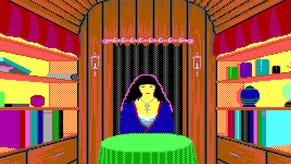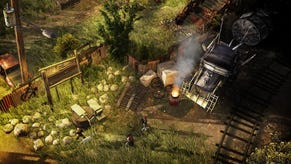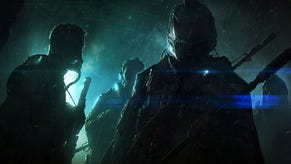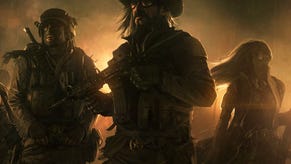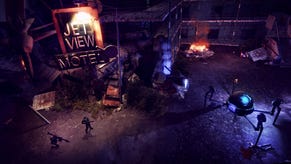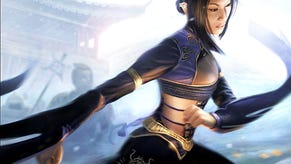In exile no more: Brian Fargo on Wasteland 2
Legendary RPG designer Brian Fargo is back in the game he loves - old school RPGs - thanks to the power of crowdfunding. Nathan Grayson tracks the inXile boss to his lair and casts Tell All.
If, this time last year, you'd crashed through my kitchen window in your Time DeLorean and told me I'd soon see a new point-and-click adventure from Double Fine, the oft-clamored-for Shadowrun RPG, a brand new Leisure Suit Larry, and a bonafide Black Isle revival under Wasteland's banner all in a matter of weeks, I would've spit scalding coffee in your face – both out of disbelief and as a self-defense mechanism. And yet, thanks to the sudden crowdsourced gold rush that is Kickstarter, here we are. The future is now, and – just as our most forward-thinking films and TV shows predicted – it looks just like the '90s.
The tides have turned, and InXile boss Brian Fargo – once forced to dance to a more action-oriented tune in games like The Bard's Tale and Hunted: Demon's Forge – is headed back to his roots, publishers be damned. Wasteland 2 used to be a pie-in-the-sky pipe dream. Now it's a poster child. That said, with the post-apocalyptic role-player's Kickstarter nearly in the history books, the balloons and bits of irradiated confetti are starting to settle.
So, where to now? Especially with Obsidian now officially in the fold, how exactly will all of this work? I got in touch with Brian Fargo to find out. Read on to hear his thoughts about what sort of game Wasteland will be, how much control fans should have in the development process, traditional publishers, Kickstarter's chances of long-term success, and much more.
VG247: How did the Obsidian deal come about? Did it start with that whole kerfuffle over the “nothing would make me happier” than rebuilding Black Isle comment, or were the wheels in motion beforehand?
Brian Fargo: The wheels for that deal were in motion before Ripten. I was amused reading the speculation because they were right for the wrong reasons but certainly they were zeroing in on it even though my comments were vague. I think it all points to what a good idea it was for us to pull Chris in for his designers touch.
What do you hope Chris Avellone and Obsidian will bring to Wasteland? Where do they fit in?
The first Wasteland game was created by a half dozen designers that were all given an area of the game for them to flex their creative muscle. We would often assign things to that designer to make sure they gave away some item or a plot element was introduced but what they did with that level was up to them. This is the exact same process for which we have many of the original designers plus Chris.
In addition Chris will weigh in with his opinions on conversations systems, UI and the like. Obsidian also has several tools that assist in getting assets in quickly, and the faster we get assets in, the quicker we can test and re-iterate. InXile will control the overall process of integration and continuity.
What sort of game are you hoping to create? It'll be reminiscent of '90s "golden age" RPGs, obviously, but how so? What sort of battle system are you hoping to implement? What sort of stat progression are you looking at? Is it linear or can players choose how they want to evolve their characters? Is the game party-based? Where will it be set?
We don’t want the tactics SO deep that you feel disconnected from the world by being in long battles all the time. The last thing we want is someone groaning every time combat pops up."
There are so many elements of Wasteland that worked quite well and we plan to build upon that foundation rather than start over from scratch. Those elements are the sandbox type world, dark humor, party based combat, tactics in battle and a skill based system. However, combat isn't going to consist of scrolling text so clearly we need to up the tactics part of the game.
And we don't want the tactics SO deep that you feel disconnected from the world by being in long battles all the time. The last thing we want is someone groaning every time combat pops up. The game is going to take place shortly after Wasteland 1 ends. And by the way for everyone who remembers little Bobby - he is p**sed off having been shot by Rangers and left for dead.
You've mentioned that you want this to be a resurrection of old-school Black Isle RPGs in general. So how do you cater to Wasteland fans and Fallout fans while also touching on games like Planescape: Torment, Baldur's Gate, etc? There's so much expectation in terms of what people want this game to be. How do you deal with all of that?
There are common threads that work their way across all those games that we are keeping a keen eye on. Having true cause and effect is a big one. A deep and interesting world is also key and there need to be surprises coming at you throughout. And yes Wasteland is party based game and that is one of the big differences from Fallout. Also there is a strong literary vibe to those games that is especially highlighted with Torment that we will continue on. We are reading every comment on our forums and setting up polls to make sure we have the broad strokes covered. Once we finalize those things we will go off and do what we do best.
On that note, how much of a role do you think fans should have in the decision-making process on games they've funded? How much do you think they have a right to know about development - if any? Are you worried that this could compromise artistic integrity? Or do traditional standards of artistic integrity as defined by books, film, etc not apply to games?
People seem to be quite concerned that fan input will get out of control but to me that is like being concerned about open beta testing. Plus with fan funding we owe them a voice to be heard and we agree with most of what the consensus likes anyway. It is important to keep in mind that it is broad strokes that we incorporate and that would range from weighing the importance of features like audio vs. game depth, Linux vs. iPad or turn- based vs. real-time combat.
Normally we would need to make these exact same decisions, except it would have been done in a vacuum. Now we have specific information on what is important. Once we agree on the vision for the game then we will implement our ideas within that framework. We aren't going to get into writing style, music composition, etc. However they will get to experience even those features once we hit beta so their voices will be heard again. As a whole, the community is quite rational and publishers would probably do better if they listened to them a little more.
Do you think this level of Kickstarter success - millions of dollars - is sustainable, or is it just a flash in the pan? Do you think Kick It Forward will help keep things at that level?
I don't see an end in sight for companies raising money with Kickstarter, but most will not be in the million dollar range. Shadowrun passed their goal of $400K and Leisure Suit Larry is well towards its minimum amount of $500K. Even the smaller projects with new developers will be tomorrow's one million dollar projects. Trust me, there will be some new group that comes along one day and blows me and Tim [Schafer] out of the water with their success. And I do believe that if we get enough companies to pledge putting a small percentage of their profits back into the community, it will keep the ecosystem alive. Kickstarter is such a wonderful way to get financed that it just makes sense to give back.
And where does nostalgia fit into all this? I mean, Double Fine Adventure may as well be the Nostalgia Justice League between Schafer and Gilbert, and now you and Chris Avellone are, I don't know, The Avengers or something. Do you think rampant fan demand for blasts from the past could keep RPGs or even the industry from progressing? Also, between you and Avellone, who's going to be played by Chris Hemsworth in the eventual film adaption?
No way is this going to push the genre back in any way. It is all good. There are some elements to those "golden age" games that are timeless but have gotten lost due to a number of factors. It became impossible to sit in a room with an executive to discuss the finer points of RPGs and why there was a demand and what things could be added to make it more exciting.
The vantage point of most publishers is from a console perspective so that sort of kills the conversation pretty quick. Just the simple need of a keyboard and mouse changes the dynamic of an RPG. Those meetings I made fun of in my video are pretty accurate. Getting dragged into conversations about the color and size of a boot as a top priority was pure insanity and would suck all the creative juices out of the room.
I guess my attitude on this is more philosophical in that if the game doesn't achieve fan funding, then it probably should not have been made. These fans just did you a favor by not voting with their wallets and saving you the time and money making something no one wanted.
"Gamers are not trying to risk money for a profit like a publisher is. They just want a certain game and they are willing to pay for it ahead of time. Ironically the fans have far more trust in developers than the publishers do, and it will be interesting to compare the track records of success. Trust vs. heavy handed management."
Gamers are not trying to risk money for a profit like a publisher is. They just want a certain game and they are willing to pay for it ahead of time. A publisher is analyzing the market to determine what people want, determining if the upside is high enough, analyzing the opportunity cost and making sure the team is capable of delivering. Ironically the fans have far more trust in developers than the publishers do, and it will be interesting to compare the track records of success. Trust vs. heavy handed management.
You're making Wasteland 2 with old-school RPG fans in mind, so what do you, personally, miss the most about those games? Do you think they went away out of necessity, or because misinformed investors willed it so?
I think I have articulated above many of the elements that I miss as a player. There is just a certain charm that comes from a game where the developers get to tinker and riff with new ideas during the process. The games just felt so connected in their humanity. Slick and polish only goes so far... it is always the human moments we remember. There is just no way the publishers can maintain their infrastructures selling just 500K or even a million copies of a game so they moved into categories or formats that could. If we sell a million copies of Wasteland 2 we will be bringing you RPGs for another decade!
How does all of this Kickstarter business actually work? Where does all the money end up? What's to keep somebody from scamming hundreds of backers? If a project falls through, is there any easy way to refund people's money?
There is a minimum pledge amount that the company establishes up front that has to be met or no money passes hands. In our case it was $900,000 dollars and that money is currently in an escrow of sorts where it will remain until our campaign ends. Once it is over then Kickstarter takes their piece as does Amazon for handling the monies and the rest comes to us. This is a huge benefit for us in that we can focus on development and not chase publishers to pay us.
There is risk as you point out from some unethical developer but that is why the larger amounts of money go towards the more established developers. I've been here for 30 years and I'm not going anywhere. On a positive sign you can look at a site like Lendingclub.com which offers crowd funded loans of up to $35k to people. They claim over 500 million dollars in loans to people with interest rates paid to the contributors of capital from 5.8 to 9.3% along with 18 straight quarters of positive returns. I sound like a commercial for them but I just think this whole new world is fascinating. This would seem like just a risky a business for putting funds up and yet it appears to be working quite well for all involved.


